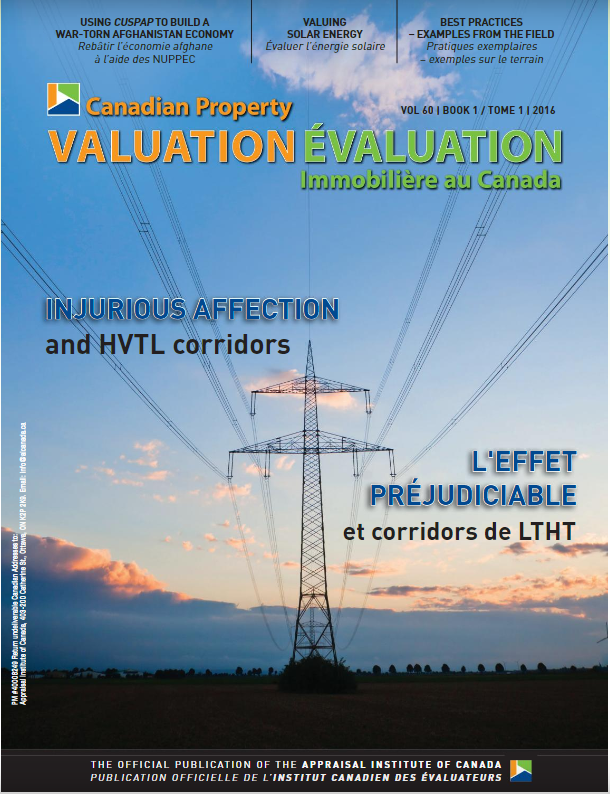CRA Diversification
Canadian Property Valuation Magazine
Search the Library Online
Here is an example of how a CRA has successfully diversified his practice.
Assessment Appeals
How did you get started doing assessment appeals?
I was contacted by an individual, who had been referred to me by a local law firm. This individual was quite wary of dealing with the Municipal Property Assessment Corporation (MPAC). They asked for my help in providing them with a quality appraisal that would be submitted to MPAC. I found the work fascinating and very rewarding and have been involved in doing assessment appeals ever since. An offshoot of the assessment appeals has been acting as an expert witness in Assessment Review Board (ARB) hearings. Did you take additional professional development in this area? Yes, I have a working relationship with a local expert assessment appeal appraiser P.J. Smith, AACI, P.App and his son Michael Smith, who were very helpful in providing guidance through the initial stages of my expanding into the assessment appeals area. I have done considerable reading on the subject through online resources such as http://elto.gov.on.ca/arb/ and https://www.ombudsman.on.ca/, as well as other publications and numerous consultations.
How do you ensure that you stay within your CRA scope of practice when doing assessment appeals?
I make absolutely sure that I only take on assessment appeal work that falls within my area of expertise, which means only dealing with vacant or improved residential properties that have up to four self-contained units. Furthermore, my personal philosophy towards my appraisal practice is that I only take on assignments that I have the competence to complete myself.
What is a typical day like for you when you are doing assessment appeals?
I would typically be contracted to complete an appraisal to determine the true market value of the property, but also to determine whether the property has been assessed in a fair and equitable manner. That means visiting the site, meeting with the owners, researching comparables, liaising with lawyers and MPAC. I also maintain a working knowledge of the Assessment Act and the policies and procedures required for effective appeal work. If you do not stay current with the Act, the battle will be lost before the fight even gets started. In many cases, I am called on to be an expert witness and provide testimony in an assessment review hearing. When you are being cross-examined by a lawyer, you have to be prepared as an expert witness to be fully accountable for your report, and to ensure that you can explain yourself in a way that clearly demonstrates your competence and expertise. That means spending extra time going over details of my report, anticipating any questions that may arise and having the information and resources at my fingertips to back up my valuation opinions. I would suggest that this specific area of appraisal work is best suited for those with a great deal of patience, and those who can work well in extremely stressful situations.
Is this a significant part of the work you do and how has it benefitted your practice?
My involvement with assessment appeals keeps me quite busy at times. However, I also enjoy many other avenues of the appraisal profession and try to maintain a well-rounded appraisal practice. The benefits for me are the knowledge obtained relative to the Assessment Act and the processes involved relating to appeal work and review hearings. As well, this area of practice has improved my general work product as a result of having to expand my knowledge of the Canadian Uniform Standards of Professional Appraisal Practice (CUSPAP) and my methodology in order to ensure that I can provide a level of work required to stand the test of scrutiny from MPAC and the arbitrator.
What are the biggest challenges in doing assessment appeals?
Some of the biggest challenges are preparing for and attending a hearing. The paperwork and preparation can be somewhat onerous, as well the time investment of attending the hearings (which can take an entire day or more for the hearing alone). Another significant challenge involves staying current with constantly changing legislation that can be very complex.
What do you find rewarding about doing assessment appeals?
The most rewarding part of completing this type of work is when you get a call from a client saying that MPAC has reduced its assessment due to your appraisal submission, or when there has been a positive outcome in an arbitration hearing. There is a feeling of elation, a sense of accomplishment, and the knowledge that you have provided your client with the best possible service to bring that outcome about. In my work experience, there is no other feeling quite like it.





